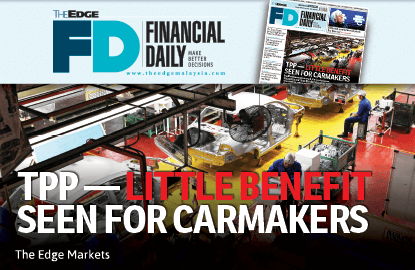
This article first appeared in The Edge Financial Daily, on January 26, 2016.

KUALA LUMPUR: The government will hold a special parliamentary session today to debate and vote on Malaysia’s participation in the Trans-Pacific Partnership (TPP) agreement. While most trade associations came out in support of the trade pact last week, the Malaysian Automotive Association’s (MAA) assertion last Thursday that it would unlikely benefit the automotive sector caught some attention.
Malaysia, according to MAA president Datuk Aishah Ahmad, does not really source vehicle components from the TPP member countries, hence the sector will not benefit in that sense. Original equipment manufacturers (OEMs), meanwhile, are not allowed to export their products overseas, so there goes the argument about wider market reach.
But Malaysia Automotive Institute chief executive Datuk Madani Sahari told reporters last Friday the pact will benefit component suppliers as it will open up the global market for them.
“Currently, they have already exported more than RM200 million worth of car components [annually] overseas. The trade pact will provide them with more market access,” said Madani.
As such, he highlighted that national carmakers (Proton Holdings Bhd and Perusahaan Otomobil Kedua Sdn Bhd [Perodua]) will similarly benefit from the trade pact as they can export their cars to the TPP member countries.
“But for OEMs, they are unlikely to export their cars to other countries; the [marque owners will] already have manufacturing plants in [different] regions,” he conceded.
Analysts, however, do not think it will be all rosy for local car manufacturers once the TPP opens up market access to other pact member countries.
“I don’t see any positive impact on national car manufacturers (Proton and Perodua) actually, as they will have to face more heated competition from other TPP member countries,” an analyst at a local brokerage firm told The Edge Financial Daily when contacted last Friday.
“Many said national carmakers will have access to the US market upon the signing of the TPP. But I don’t see much demand from the Western market for compact cars,” the analyst added.
Another analyst pointed out that the national carmakers will have to buck up, and deliver better products and aftersales services to wrestle market share from other brands.
“They will have to compete with renowned brands like Toyota, Honda and Nissan, which are widely accepted by many countries,” the analyst said, adding that only America-based automakers will benefit as they source their materials from the countries of origin.
Nevertheless, analysts stressed it is difficult to ascertain the exact impact of the TPP now, given that information on the pact remains sketchy.
Last Thursday, Proton Edar Dealers Association Malaysia (Peda) was reported as saying it was confident that the TPP would provide wider market access for Proton within the 12 participating countries.
Peda president Armin Baniaz Pahamin was quoted as saying that the local market would eventually benefit through more competitive pricing due to economies of scale attained.
“We believe the TPP will liberalise these restrictions to make it easy for us to export our cars to [the] member countries,” he said, adding that Proton would continue to face stringent import restrictions on its cars in foreign markets without the trade agreement.
Meanwhile, recall that PricewaterhouseCoopers Advisory Services Sdn Bhd (PwC), together with the Institute of Strategic and International Studies, had both concluded that the trade agreement is generally positive for the country.
According to PwC’s cost-benefit analysis of the trade pact released last month, the TPP countries accounted for 24% of Malaysia’s exports of automotive components in 2014, with Singapore, the United States and Japan contributing 81% of the TPP countries’ demand for automotive components.
“While existing FTAs (free trade agreements) have eliminated tariffs on automotive components among the Asean economies, and will eliminate tariffs with Australia and Japan by 2016, the TPP would further expand market access for Malaysia’s automotive component manufacturers by eliminating tariffs with the US, Canada and Mexico,” it added.
These countries presently impose tariffs of 0.4% to 13.3% on Malaysia’s exports of automotive components, said PwC.
“Greater market access under the TPP, particularly to the US, would facilitate these firms in increasing exports of automotive components towards achieving the National Automotive Policy 2014 target of RM10 billion by 2020, from RM4.7 billion in 2014,” it added.
The consulting firm, however, noted that this requires Malaysia’s automotive component manufacturers to develop the flexibility to cater to a variety of technical specifications and standards across the TPP member countries.